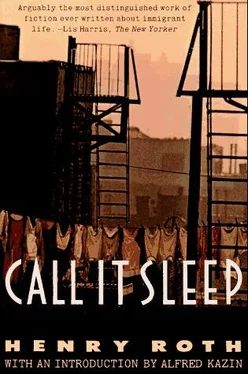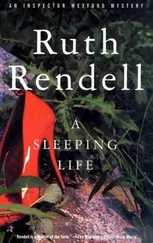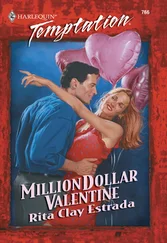“Don’ worry! Dere jis layin’ low, you watch!” He squinted at the distant roofs. “But I ain’ gonna let it out dough.”
“No.” He was relieved that the topic had changed. “How much cost a kite?”
“Dat one’s on’y two cents. Butcha gotta git a lodda cord wid it, er ye can’t fly it.”
“Kentcha fly wit’ cotton?”
“Naw! It busts. I had a big kite oncet — twicet as big as dis one — an’ wot a pull on it — an’ it busted wid even red cord. Wuz way out over St. Jame’s Parochial on Twelft’ an’ Avenee C — yuh c’n see de cross — See it?”
“Yea.”
“Wuz full o’ messages an’ den it went an’ busted. Lost nearly all me cord too — got twissed on de roofs.”
“Why yuh god id?” David gazed out at the distant spire outlined against the hazy western blue. “Dat funny cross ev’y place?”
“Funny?” Leo’s voice was nettled. “Wot’s funny about it?”
“Not funny — I didn’t mean!” He was quick to mollify. “I mean w’y yuh god id?”
“Crosses is holy.” Leo instructed him severely, “All of ’em. Christ, our Savior, died on one o’ dem.”
“Oh! (Savior! What?) I didn’t know.”
“Sure, even if yuh wears ’em, dey bring yuh luck. When me ol’ lady had her appendixitis cut out, she had one o ’dem under her piller ev’y night, an’ dat’s w’y she got better.”
“Gee!”
“Yea an’ ev’y’ time I goes swimmin’ in de Hudson I always cross meself t’ree times — like dat. Den yuh kin Johnny-high-dive all yuh wants an’ yuh’ll never hit bottom — didn’tcha know dat?” And when David looked blank. “Yuh see dis?” As if to clinch his argument, he undid a button on his shirt, reached in and drew out what looked like a square piece of leather on a string. “Know what dat is?”
He scrutinized it, shook his head. Something had been stamped on it in gold — a picture perhaps — but too faded now to make out. “Maybe a man an’ a liddle lady,” he ventured. “I can’t see so good.”
“A man and a lady!” Leo turned his head aside to crow. “Oh boy, wot Jews don’ know! Dat’s a scapiller, see? An’ dat’s a pitcher o’ de holy Mudder an’ Chil’. Cheez! Doncha know de Woigin Mary w’en yuh sees ’er?”
“No,” guiltily.
“Cheez!” incredulously, and then lifting the bit of leather to examine it more closely, “It’s gittin’ rubbed off, I guess.” He slipped it back under his shirt. “Dat’s cawz I goes swimmin’ in it all de time in de river.”
“An’ yuh ain’ ascared o’ nottin’ w’en yuh god dat on?”
“Naw! I tol’ ye!”
“Chee!” David sighed and gazed at Leo’s chest half in awe, half in envy.
— Not afraid! Leo wasn’t afraid!
“Hey, look out for dat kite!” Leo relieved him hastily of the string. “Yuh don’ wanna led it dive like dat, it’ll smack a roof!”
— Not afraid!
VIII
THE hour that had passed had been one of the most blissful in David’s life. He had never wanted to be anyone’s friend until this moment, and now he would have given anything to be Leo’s. The longer he heard him speak, the longer he watched him, the more he became convinced that Leo belonged to a rarer, bolder, carefree world. There was a glamour about him. He did what he pleased and when he pleased. He was not only free of parents, but he also wore something about his neck that made him almost god-like. Sitting next to him, David’s one concern had been how to ingratiate himself, how to keep Leo amused, keep him from remembering that time was passing. Whenever Leo had laughed, David had felt his own bosom swell up with joy; even when Leo had jeered at him he felt grateful. It was right that Leo should jeer at him. Leo was a superior being; his laugh was just. When Leo had asked him whether Jews wore amulets on their persons, David had described the “Tzitzos” that some Jewish boys wore under their shirts, and the “Tfilin”, the little leather boxes, he had seen men strap around their arms and brows in the synagogue — had described them, hoping that Leo would laugh. He did. And even when Leo had said of the “Mezuzeh”, the little metal-covered scroll that all Jews tacked on the door-posts above their thresholds—“Oh! Izzat wotchuh call em? Miss oozer? Me ol’ lady tore one o’ dem off de door w’en we moved in, and I busted it, an’ cheez! It wuz all full o’ Chinee on liddle terlit paper — all aroun’ an’ aroun’.” David had not been hurt. He had felt a slight qualm of guilt, yes, guilt because he was betraying all the Jews in his house who had Mezuzehs above their doors; but if Leo thought it was funny, then it was funny and it didn’t matter. He had even added lamely that the only thing Jews wore around their necks were camphor balls against measles, merely to hear the intoxicating sound of Leo’s derisive laugh. But at last, Time would have his way. The sun had risen to the zenith and Leo began drawing in the kite-cord. Resentfully, David eyed the approaching kite.
“Yuh ain’ gonna fly no maw?” he asked hoping against hope.
“Naw, I’m goin’ down.”
David hoped he would be invited. He wasn’t. “Wy’ntcha comm t’morreh again?” he urged.
“I’m goin’t’ elevent’, I tol’ yuh.”
His answer was like a pang. He was slipping away. He might never see him again! “Wish I had skates!” he said fervently. “Chee! I wish I had skates!” And suddenly a new thought struck him. “Wot time yuh commin’ home? Dont’cha comm home on twelve a’clock an’ eat?”
“Naw. I buys a couple o’ franks on a roll fer a jit.”
The last shred of hope. Leo’s freedom was unattainable. David could feel himself drooping. “So I ain’ gonna see yuh?” he asked miserably.
“Hodda ya wan’ me to know.” Leo had begun climbing down the shed.
“I’ll ged yuh somm cake—” David followed him down. “Big hunks if yuh comm up hea tomorreh.”
“Naw!”
“Can’t I comm witchuh? I c’n walk.”
But his clinging to Leo only tended to make him more unfriendly. “G’wan! I don’ wancher hanging’ aroun’ me. Ye ain’t big enough.”
“Yes I am!”
“Betcha y’ain’t even ten.”
“Sure I am!” He lied eagerly. “I’m goin’ on eleb’n.”
“Well, I’m goin’ on twelve. Ye ain’t got skates anyway.” He opened the roof-door, impatiently. “Better go acrost now, ’cause I’m goin down.” And as he stepped down, “So long!” And abruptly shut the roof-door behind him.”
“So long!” he called through the metal-covered door. “So long, Leo!” And could have wept the next moment. A little while he stood staring at the door, and then mournfully crossed over the roofs and sat down on the box. Without Leo, the roof had suddenly become vacant, had lost its appeal. Nor was sitting on the box comfortable any longer — he could feel its hard edges now, biting into his thighs. But a kind of inertia engendered by loss kept him where he was, and he leaned back broodily against the skylight. Skates. That was the real reason why he had lost Leo — because he lacked them. He could almost see the gulf between himself and Leo widening with Leo’s flying skates. And he had liked Leo so much, even if he was a goy, had liked him better than anyone in the whole block. If only he had a pair of skates! There was very little chance though. A penny a day his mother gave him; that made two on Tuesday; three on Wednesday. It would take forever, and one needed dollars and dollars. If he had a pair of skates he could leave the hated boys on his block behind him; he could go to Leo’s block, to Central Park, as Leo said he did. That park with the trees, where he went with Aunt Bertha, that white museum — Aunt Bertha! Her candy store! She must have skates in her candy store! She might even have an old pair that she would give him for nothing! Why hadn’t he thought of that before? He’d go now. No, he couldn’t go now. There was luncheon and cheder. He’d go to-morrow. Oh, wait till Leo saw him with his skates! He hurried joyfully down the stairs.
Читать дальше












